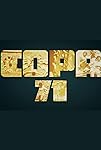Eye For Film >> Movies >> Copa 71 (2023) Film Review
Copa 71
Reviewed by: Amber Wilkinson

Coming hot on the heels of the 2023 Women’s World Cup - which saw 12 million viewers tune in to watch the final in the UK alone - this documentary about its little known predecessor 50 years ago was sure to attract attention. However, in the wake of the kissing scandal of Spanish football chief Luis Rubiales Rachel Ramsay and James Erskine’s film about the Mexican Women’s World Cup of 1971 takes on additional resonance.
Their film offers a traditional mix of talking heads, archive footage and academic observation but it’s packaged with care and served up with verve. US player and two-time World Cup champ Brandi Chastain will speak for most of us when, in the opening moments, she looks at footage from one of the packed Mexican stadiums in disbelief and says: “Why didn’t I know about this?” Leaving aside the fact that this isn’t quite the hidden history the film would like to suggest, this, for many of us, is becoming a regular question to be asked when watching a documentary that concerns the achievements of anyone who isn’t male and white - any number of which in the last few years, from My Name Is Pauli Murray to Ailey, have indicated just how many histories remain, if not completely unknown, then definitely under-explored. Those interested in sporting erasure of all but white men should also look out for the more experimental and academically leaning Life Is Not A Competition But I’m Winning, which premiered at this year’s Venice Film Festival.
As Copa 71 goes on to show, it’s not the players that are the problem but the lack of a level playing field. There has always been a tendency for women’s football to find popularity, even back in the nascent days of the sport, but those in power - for which we can basically read, men - weren’t so keen on the idea. Sports writer and academic David Goldblatt points out there were 100 women’s clubs in Britain in 1917 but after doctors whipped up tales of the sport being bad for women’s health the Footaball Association banned the sport in 1951, saying it was “quite unsuitable for females and should not be encouraged”, an edict that remained in place until 1970. Of course, as this film continually nudges at, the issue was not about health but about power and control, with a good dollop of sexism thrown in for good measure.
Enter, then, the women who were trailblazers, representing Mexico, England, Denmark, Argentina, France and Italy at the 1971 tournament. They may be from different countries but the tales they tell are remarkably similar. Almost all had a love of the game from an early age and almost all faced roadblocks in terms of playing it. Their joy at recalling the chance to go to Copa 71 and all that followed is infectious and a sharp edit from experienced sports doc hand Arturo Calvete and newcomer Mark Roberts means that the archive photos and footage are used in a way that breathes even more energy into their stories.
The directors use a zoom technique on photos to clue us into who is who when observing the younger versions of the players that is effective but unobtrusive so that they keep us orientated without interrupting the flow of the recollections. Each game is played out via the memories of the players and illustrated with footage but there’s also a rounding out of the experience as a whole. That means we get a real sense of the wonder the women felt as they were suddenly propelled from home turf obscurity to Mexican fame. Speaking of the shock at all the press attention on arrival, English captain Carol Wilson recalls: “I said there’s someone famous on this plane. It was us.”
The games themselves prove gripping and just as physical as anything the men served up during that period - it’s notable that two of the English players captured in a photo on their return are wearing casts. The women’s emotion hits the back of the net even if there’s a tendency for the film to race over issues like the subject of fair pay, which it briefly raises. There's also the question of what happened afterwards - a closing of ranks and doors - but this film puts the emphasis on celebration rather than opprobrium. Unlike the women, it may not be breaking new ground, but its enthusiasm is likely to attract plenty of fans.
Reviewed on: 08 Sep 2023

















